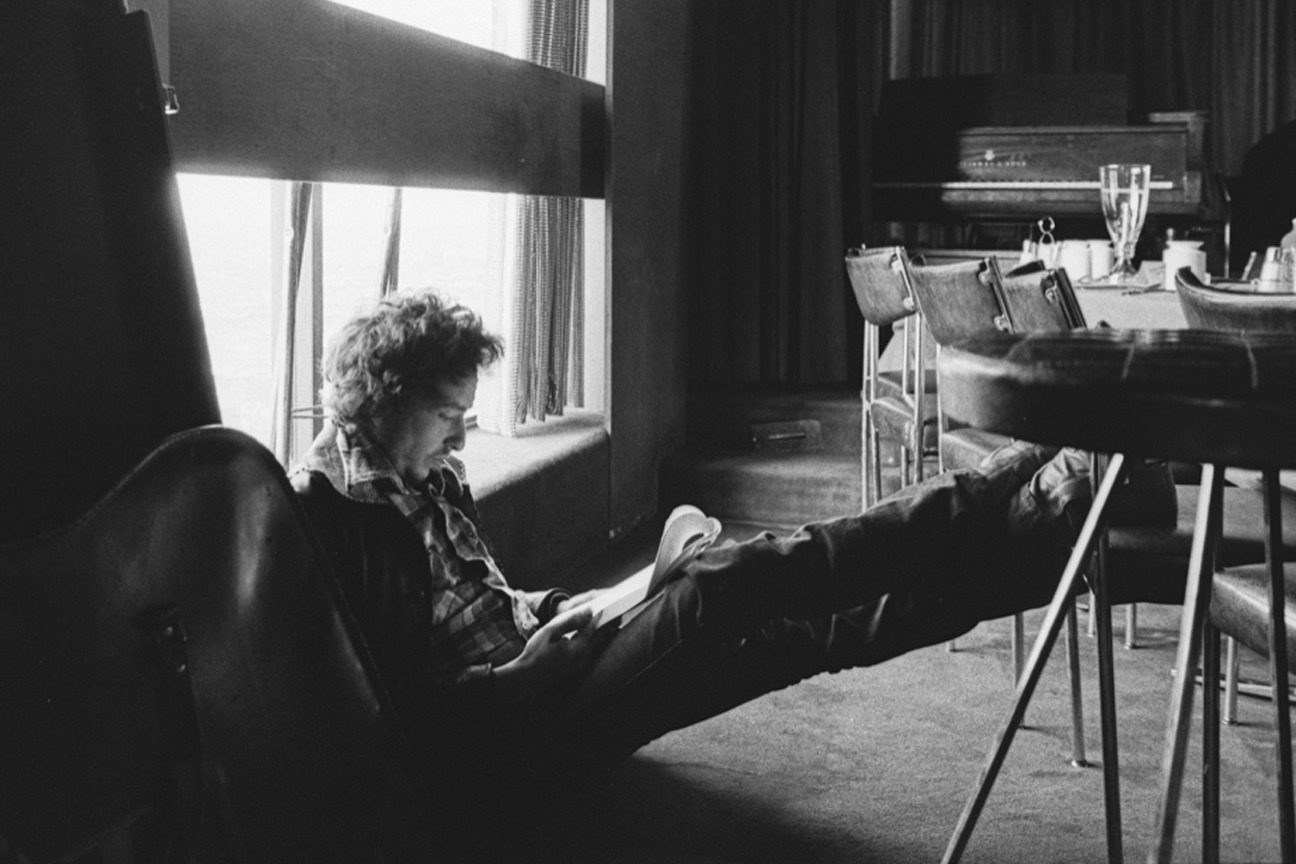As a (likely) Minnesotan, you should already know that today is Bob Dylan's 82nd birthday. To celebrate, we're a-gonna run the full introduction to Blood in the Tracks: The Minnesota Musicians behind Dylan's Masterpiece, the upcoming book from local authors Paul Metsa and Rick Shefchik.
In it, Dylan junkies learn "the story of two nights in Minneapolis when six Minnesota musicians participated in a recording session with Bob Dylan as he re-recorded five songs on Blood on the Tracks, bringing their unique sound to some of Dylan’s best-known songs—only to have their names left off the album and their contribution unacknowledged for more than 40 years," according to publisher University of Minnesota Press. You can pre-order Metsa and Shefchik's book here.
Happy bday, Bob!
For decades, a bootleg CD titled Blood on the Tracks: The New York Sessions circulated among Bob Dylan’s most devoted fans, and it became close to gospel among this cognoscenti that the released version of Dylan’s masterpiece (half of which was recut in a Minneapolis studio) was in fact an inferior makeover of an album that was nearly perfect in its original form. This opinion held that Dylan had lost his nerve on the eve of the release of a record that was vitally important to his career; that he mistakenly listened to his provincial brother, David Zimmerman, who convinced him the songs were too dark, too stark, too mellow for the album to become a hit; and that instead of trusting the work and instincts of famous New York engineer Phil Ramone and the experienced studio pros who contributed their chops to the original recordings, he instead relied on an anonymous group of pickup musicians in Minneapolis, who weren’t worthy of the responsibility, to re-record five of the 10 tracks on the album.
Among Dylan’s peers who preferred the original New York version of the album were Robbie Robertson (“The first recordings he played for me still stuck in my mind”) and Joni Mitchell (“They butchered it”). When such heavyweights express their preference, the rest of the music world tends to fall in line. Even rock critic Robert Christgau, who gave the album a rare A in his monthly Village Voice Consumer Guide, referred to the “unknown Minneapolis studio musicians who impose nothing beyond a certain anonymous brightness.” Yet it was that “anonymous brightness” that may well have elevated Blood on the Tracks from great to a masterpiece. Surely there isn’t much room for improvement when an album is ranked by Rolling Stone as the ninth best ever recorded, as of 2020.
For forty-four years, the Minneapolis pros who played on the revised songs on Blood on the Tracks went uncredited. Because Dylan delivered the re-recorded tracks to Columbia just weeks ahead of the album’s scheduled January 1975 release, the label chose not to alter the already printed back-cover credits—which only mentioned the New York studio musicians who accompanied Dylan on the original recordings, laid down in September 1974. The Minneapolis musicians who recut five of the album’s 10 songs with Dylan that December were told that their names would appear on the album’s credits if and when there was a second pressing. The album was an immediate success, quickly selling out the initial run of 150,000 copies, but Columbia did not alter the credits on the second pressing or any subsequent editions. Indeed, if you are still of a mind to purchase the currently available—and remastered—CD version of Blood on the Tracks, you will find the credits read exactly as they did when the album was first released.
Fortunately, Dylan began a comprehensive archival release program several decades ago, making commercially available the outtakes and concert recordings that had made him the most extensively bootlegged artist in music history. In 2018, Dylan and Columbia finally got around to releasing More Blood, More Tracks, a six-CD collection that included every existing outtake and officially released version of each of the songs recorded during the Blood on the Tracks sessions in New York and Minneapolis. On that collection the Minneapolis musicians (drummer Bill Berg, bassist Billy Peterson, keyboardist Gregg Inhofer, guitar players Kevin Odegard and Chris Weber, and mandolin player Peter Ostroushko) received their first official credits for their work on the album. Fans of the album and Dylan scholars were finally able to listen to all versions of the songs and decide for themselves whether Dylan had made a mistake recutting five of the songs, as both the New York and Minneapolis studio versions could now be heard. It was the culmination of a long march to redemption for a group of unjustly ignored but richly deserving Minnesota musicians.
While one opinion has always held that the New York musicians (Eric Weissberg, Tom McFaul, Tony Brown, Charles Brown III, Richard Crooks, Buddy Cage, and Paul Griffin) were seasoned pros with far more impressive credentials than their Minneapolis counterparts, history has shown that the band assembled by David Zimmerman at Sound 80 had every bit the experience, résumé, and range as the New York musicians. As their life stories unfold in this book, it will become clear that these musicians were supremely qualified to make their vital contributions to Dylan’s masterpiece. In addition, there is evidence to suggest that Sound 80 engineer Paul Martinson—not having worked with Paul Simon, Barbra Streisand, or Frank Sinatra, as had Phil Ramone—was equally skilled at twisting the knobs, catching the best performances, and, equally important, providing the right tone and atmosphere to bring out the best in a mercurial figure like Bob Dylan.
Perhaps most central to the successful midcourse correction that resulted in the final version of Blood on the Tracks is that those five re-recorded songs were performed by Dylan with musicians who shared his Minnesota DNA. Every note played on the Minneapolis sessions was executed by players who had come of age in the land of 10,000 lakes, 67,000 farms, and 220,000 snowmobiles. They had never taken their careers for granted; rather, they cherished their places in the music world that often thought of them as somehow second-class. These performances reflected hard-earned musical savvy strained through the experience of hundreds of gigs in far north bars, dance clubs, coffeehouses, and juke joints—just the kinds of places Dylan grew up playing in and singing about. The compatibility was palpable, and the results speak for themselves.
This is not a book solely about Bob Dylan. It’s a book about the inspiration, creation, and sustained life span of one of the enduring masterpieces of American recorded music. It’s a book about the many lives that contributed to that masterpiece, including but not limited to that of the Minnesota bard himself. And it is a book that gives long overdue credit to the musical magic that took place at Sound 80 Studios in Minneapolis in late December 1974. On “You’re Going to Make Me Lonesome When You Go,” perhaps the most covered song from Blood on the Tracks, Dylan famously sang, “When something’s not right, it’s wrong.” Conversely, when something is right, it should be acknowledged, examined, and celebrated. This book is that acknowledgment, examination, and celebration.






